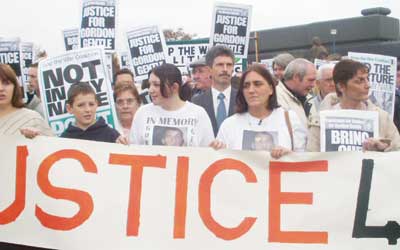Law Weblog
Lotto rapist: statutory interpretation and precedent
Thursday 31 January 2008 at 11:15 pm | In News | Post Comment A v Hoare [2008] HL
A v Hoare [2008] HL
[Statutory interpretation – intention of Parliament – precedent use of Practice Statement]
D, known as the Lotto rapist (convicted of several sexual assaults, including rape) attempted to rape V in 1989. He was given a life sentence. At that time, he was not worth suing for damages. In 2004, on day release from prison he bought a lottery ticket and won £7 million. So in 2005, V sued for personal injury, but the claim was rejected by the High Court because her claim had been brought after the six-year limit imposed by the Limitation Act 1980.
Held: A compensation claim against D could go to the High Court for hearing.
The Limitation Act 1980 requires a claimant to bring an action against her assailant for injury within 6 years.
However, Parliament could not have intended to exclude those who had been intentionally injured. Otherwise anomalies would arise such as S v W (child abuse: damages) [1995], in which it was held that a claimant suing out of time was able to pursue a claim against her mother for failing to protect her against sexual abuse by her father, but not a claim against the father himself.
The lower courts considered themselves bound by Stubbings v Webb [1993] HL in which it was held that the flexibility provided for elsewhere in the Act did not apply to a case of deliberate assault, including acts of indecent assault.
The claimant contended that Stubbings v Webb had been wrongly decided and that the House should depart from it. She relied, inter alia, on the Law Commission’s report (Law Com No 270) which recommended a uniform regime for personal injuries, whether the claim was made in negligence or trespass to the person.
Courts had a discretion under s 33 of the Act to extend the time in the claimants’ favour.
Time ran from when the claimant knew of the injury, which was both a subjective and objective test not whether the claimant considered it serious enough to justify proceedings but whether she would ‘reasonably’ have done so. Once it had been ascertained what the claimant knew and what she should be treated as having known, the actual claimant dropped out of the picture.
Stubbings v Webb [1993] HL overruled; Letang v Cooper [1964] approved.
KR v Bryn Alyn Community (Holdings) Ltd (in liq) [2003] All ER (D) 101 (Jun) disapproved.
Claimant won
Statute book is cluttered with dead law
Thursday 31 January 2008 at 8:33 am | In News | Post CommentObsolete provisions, which have long ceased to mean anything, continue to masquerade as live law. The Law Commission of England and Wales and the Scottish Law Commission are committed to modernising the statute book and will present a report to Parliament with proposals for repeal.
The 18th Statute Law (Repeals) Bill, which will be presented to Parliament, will repeal 260 whole Acts and part repeal 68 other Acts. The Bill covers a diverse range of subjects, from turnpikes to workhouses, from county gaols and tax to an old channel tunnel initiative. The earliest repeal is from 1695 (London to Harwich Roads Act) and the latest is part of the Criminal Justice Act 2003.
All those potentially affected by the repeal of the provisions were given the opportunity to contribute views.
Details here
New QCs announced
Wednesday 23 January 2008 at 12:25 am | In News | Post CommentThe new lawyers to be promoted to Queen’s Counsel were announced on 22nd January 2008. This is the Second year of the independent procedure.
There were 333 applications, of which 98 (29%) were successful.
Details are here.
Legal aid in chaos as DSCC expands
Monday 21 January 2008 at 9:29 pm | In News | Post CommentMore legal aid chaos was reported this week as criminal practitioners claimed police station advice was in ‘meltdown’ following the extension of the Defence Solicitor Call Centre (DSCC).
Law Gazette article here.
Bail, judges and the role of the Lord Chancellor
Saturday 19 January 2008 at 7:51 am | In News | 1 CommentThe Lord Chancellor, Straw is obliged by the Constitutional Reform Act to protect the independence of the judiciary; he did  so when he delivered the David Hatch Memorial Lecture on 17 January.
so when he delivered the David Hatch Memorial Lecture on 17 January.
There are two “appalling” cases currently in the public eye where the judges who granted bail have been criticised. Garry Newlove, who was kicked to death by a teenage gang including one youngster who had been freed on bail hours before; and Garry Weddell, who had also been bailed before allegedly killing his mother-in-law.
Jack Straw said that the decision as to whether to grant bail to a defendant is always a difficult one for judges and magistrates. These must be independent judicial decisions based on the law as it is, and they do so to a very high standard.
He went on to say, that these cases highlight the desperately difficult decisions facing judges and magistrates and that Judges, magistrates, and the parole board sometimes attracts the opprobrium of the press, the public and (on occasion) politicians which they don’t deserve.
Judges must be free to come to their decisions in individual cases without interference; there must be a better appreciation of the care and professionalism, which they show.
Nine Lords a leaping
Tuesday 8 January 2008 at 8:41 pm | In News | Post CommentMilitary Families Against the War will appeal against a ruling that prevented a public inquiry into the legality of Britain’s military involvement in the invasion of Iraq.
Nine Law L ords will hear the case in mid-February, only the fourth time in history that so many judges have been involved in a hearing. In very important cases seven judges sit, the usual complement is four.
ords will hear the case in mid-February, only the fourth time in history that so many judges have been involved in a hearing. In very important cases seven judges sit, the usual complement is four.
The action is on behalf of Rose Gentle and Beverley Clarke, both of whom lost their sons in action in the Iraq war.
Powered by WordPress with Pool theme design by Borja Fernandez.
Entries and comments feeds.
Valid XHTML and CSS. ^Top^